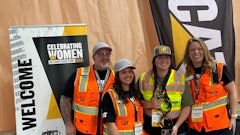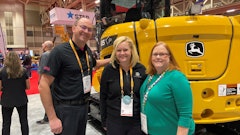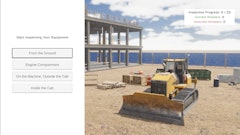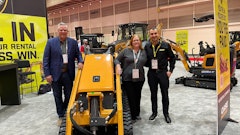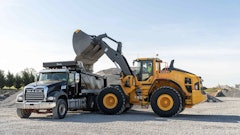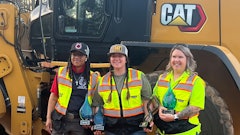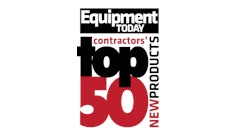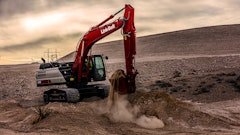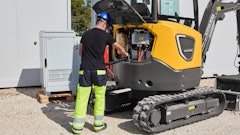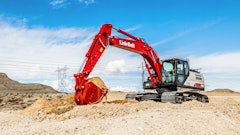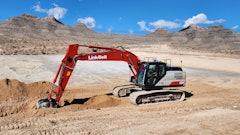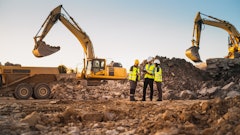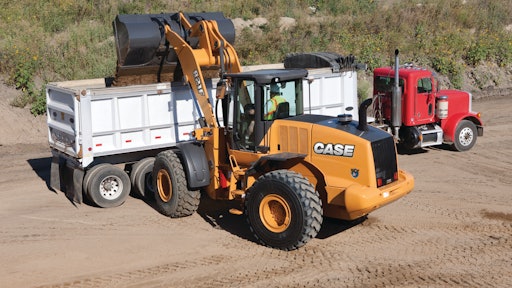
Wheel loaders typically offer an impressive list of options, from extended reach booms and counterweights to auxiliary hydraulics, differential locks, ride control, rear view cameras, air suspension seats and more. Choosing the right options aids productivity while making your machine more valuable on the secondary market.
“Outfitting a wheel loader with optional equipment and services allows that machine to hold or increase its resale value better than the machines without these options,” says Philippe Bisson, brand marketing manager, Case Construction Equipment. “Some options we see as positively affecting resale value are ride control, heat and air conditioning (AC), scales, remote jump start and reversible fan. The type of coupler is important if that next owner requires attachment versatility. Features such as a third spool valve also provide greater attachment versatility and make the machine easier to sell.”
The significance an option plays in the value of a wheel loader really depends on its impact to overall machine performance. For instance, the Volvo OptiShift, which provides a lock-up torque converter and reverse by braking function, adds value through performance and fuel-savings gains. “It offers a significant fuel savings and it also helps increase productivity,” says Eric Yeomans, product manager, Volvo Construction Equipment. “If you have a machine that has OptiShift and you have a standard machine, I am sure the customer would pay more for the option that would, at the end of the day, put more money in his pocket.”
There is wide disparity between various manufacturers as to which features are standard and which are optional. Certain manufacturers will base it on demand and profitability, with options viewed as a profit center. Others use it to help differentiate their product line.
For instance, Kawasaki has incorporated a number of standard operator comfort features into its Z7 line of loaders, many of which were options in the previous generations and are still options with its competitors. Such features include a radio, suspension seat, AC/heater and accessory outlet.
Some manufacturers offer fully featured models that include most of the features offered as options by other OEMs. For example, Hyundai wheel loaders come standard with air ride, heated seats, an electric cab heater that provides instant heat until the coolant warms, auto-reversing fan, digital automatic AC and heat, HiMate remote management system, heated mirrors, third valve for auxiliary hydraulics and limited-slip differentials fore and aft.
“If you build it into the machine and make it standard, the price shrinks dramatically rather than having to put it in as a factory-installed option on the line,” says Todd Johnson, Hyundai. “Plus, we want to supply the exact machine the customer wants quickly. If you have numerous different options, it is real hard to make sure you have the right one.” This approach eliminates the guesswork.
Most popular options
According to KCMA, manufacturer of Kawasaki brand wheel loaders, the most popular options are ride control, joystick steering, counterweights and radial tires. “Ride control is easily our most popular option, and it is optional throughout our line,” says Sam Shelton. “Seventy percent of our loaders are sold with ride control.”
Case Construction Equipment also notes a very high take rate on ride control. “Approximately 80% of customers select it,” says Bisson. The company also reports an 80% take rate on its heavy-duty counterweight option.
While ride control is very popular on large loaders, it is commonly overlooked on smaller size classes. “Probably the most overlooked — especially among owners who are not the operators — is the ride control on the smaller machines,” says Johnson. “I think that is a big oversight.”
“People sometimes miss out on how important ride control is, especially on large machines,” says Yeomans. “When you start to do a lot of load and carry, it helps keep material in the bucket. In our tests, we have seen approximately 15% higher productivity when you run the machine equipped with ride control. With the right application, most machine owners can get a return on investment in six to 12 months.” Ride control also helps eliminate stresses on the loader linkage and frame, which is important to prolonging the life of the machine.
Quick couplers add versatility, but not always resale value. “The quick coupler is another very popular option, as it allows flexibility and interchangeability of attachments, making the loader more adaptable to many applications,” notes Shelton. “However, this option does not always translate to higher resale value. It may factor in on the overall purchasing decision. Quick couplers are easily found on the secondary market.”
One of the latest options gaining in popularity is telematics capability. “If a machine is telematics ready, that will also improve resale value as it gives the next owner the flexibility to incorporate that technology,” says Bisson. “All heavy Case wheel loaders (521F and up) come standard as ‘telematics ready’ with a three-year Advanced Case SiteWatch telematics subscription. We feel it’s important to offer this to customers as standard technology because it makes it easier for them to begin working with and understanding the benefits of telematics without the burden of additional investment.”
“Telematics may also influence a buyer as they may have access to maintenance and performance records (i.e., the loader’s bill of health),” Shelton adds.
Axle options gain traction
Axle options vary by manufacturer. Some manufacturers still offer open differentials as standard with an option for limited slip. Differential locks are also usually options. Size and application play a major role in determining which solution is right for your application.
“Depending on the model, we have differential lock, limited slip and open differential,” says Bisson. “We also have heavy-duty axles with auto-locking front differential and rear conventional differential for applications where solid tires may be needed — ideal for paved and hard/compacted surfaces.”
Hyundai offers limited-slip axles fore and aft as standard equipment on models up to its 5 1/2-yd. machine, with optional front and rear electric differential lockups. Most applications do not need electric lockup on both axles; exceptions include applications in loose materials, such as piling corn in open bunkers.
Hyundai’s 7-yd. machine offers a front limited-slip differential with a full transmission lockup and front electric differential lockup. “When you get into the larger models in quarries and gravel pits, the lockups are not really necessary,” says Johnson.
One option everyone should investigate is axle oil coolers. Keeping oil temperature in check increases axle and brake life.
On bigger models, the axle cooling option is often overlooked. “[Wheel loaders] are starting to get used like large forklifts,” says Johnson. “They are hauling material on a larger site where you build up heat in the axle. [Axle coolers] save down the road. In the used market, a customer knows that an axle has been cooled on a larger, 5 1/2-yd. machine and up, where they really build some heat.”
Volvo realizes the value of axle cooling and has a unique feature as standard on its wheel loaders. “All of our wheel loaders are equipped with oil circulation within the axle,” says Yeomans. The brakes serve as a pump that starts circulating the oil as soon as the wheels move. “It keeps the axles and brakes running a lot cooler. It really adds to the service life.”
Even the right tires make a difference. “The type of tires also impacts resale value,” says Bisson. “Name brand and specialty tires (depending on application) can raise resale value.”
“Radial tires, while application dependent, can increase the value since they are in demand and have proven a greater life in mainstream applications,” adds Shelton.
Application-specific Options
“High-lift boom arms have been very popular in certain applications... and can add a lot of value if purchased in that market,” says Shelton.
“Probably the highest payback when you are looking at an option is the XTD version, or the extra reach option, which is good for filling trucks, screeners, feed mills — any height dump situation,” Johnson asserts. “You get a larger counterweight and more reach. You are probably looking, at the retail level, at a couple thousand dollars. Depending upon the size of the machine, you get a foot to 18 in. of height as well as reach out from the machine. Anytime you are filling dirt into larger dump trucks, that extra height is a must.”
Volvo also reports the high-reach option is very popular. “Without the high reach, you can’t get close to the center of the truck where you should be dumping,” says Yeomans. Another benefit of high-reach is the increased distance from the bucket to the front tires. This provides additional protection when digging in abrasive material that can damage the tires, which are probably the most expensive replacement item on wheel loaders. The option sometimes requires an additional counterweight to balance out the extra reach of the machine.
Another more application-specific option is third spool hydraulics, according to KCMA. This option is typically found in mid-range loaders, where attachment flexibility is important.
“The third hydraulic function gives you the ability to put a grapple or broom on the front,” says Yeomans. “You can also operate a brush cutter. The extra hydraulic function is quite popular. The take rate is quite high — 50% to 60%.”
Case offers an optional third spool, and has a kit available for a dealer-installed fourth spool. “These [options] do improve resale value as it gives the next owner greater flexibility in terms of attachment use,” says Bisson. “The auxiliary hydraulics are most popular on our 621F, 721F and 821F models and are typically adopted at a rate of 72%. As you get into larger wheel loaders, the take rate on auxiliary hydraulics is more in line with 60%, but it always varies by application.”
Cab comforts abound
The automotive world is changing expectations for construction equipment, and available amenities along with them.
For example, Hyundai includes digital temperature/audio control in its cabs. “It is very much like most cars nowadays —you set the temp and it does everything for you,” says Johnson. “There is an AM/FM MP3 radio that has Bluetooth for hands-free phone. It has a dash-mounted mic that is adjustable.”
Long hours in the cab also place an emphasis on ergonomics. “Customers are starting to appreciate air-operated seats instead of standard manually adjusted seats,” says Yeomans. “It is a lot easier to adjust up and down and you get a more comfortable ride. When you are sitting in the cab for eight to 10 hours, the more fatigued you become, the less productive you become.”
“Options available on Case wheel loaders that help improve the operator environment include climate control (heat and air conditioning), a radio, heated and cloth-covered air suspension seat and Sound Shield noise suppression package,” says Bisson.
Joystick steering can also be classified as a comfort option. “It’s important to note that while technically a steering option, the joystick controls also play an important role in improving operator comfort by reducing fatigue in operation,” says Bisson. “Case offers optional joystick controls on all models in its heavy line in addition to the standard steering.”
Volvo also touts the ergonomic benefits of joystick controls. “Instead of using the steering wheel, we have a comfort option where your left hand operates the steering and forward and reverse controls, and your right hand controls all of the hydraulic functions,” says Yeomans. “That gives you a more comfortable ride than using the steering wheel. With the steering wheel, you are rotating all of the time, so you are getting fatigued throughout the day. With the steering wheel, it is 3 1/2 turns lock-to-lock. With the lever, you just move a finger and it goes automatically from lock to lock. It is very quick.”
Operator demographics can play a key role in the decision to purchase joystick controls. Shelton notes that joystick steering is an option on the Kawasaki 80Z7 through 95Z7 and standard on the 115Z7. “This is very much an operator preference option,” she says. “Popularity isn’t so much by machine size as it is by operator demographics and experience.”
Added Safety and visibility
There are many safety options that increase visibility around the machine.
“Safety options offered on Case wheel loaders include rear view and side view cameras, lighting packages and a reversible fan,” says Bisson. He notes that a reversible fan can be considered a safety feature in environments where debris can build up and cause thermal events.
Many manufacturers offer rear view cameras as standard, while others offer them as an option. Lighting is also a key safety option for contractors working at night. Most manufacturers offer auxiliary lighting packages to supplement their standard lighting packages.
In addition, Volvo offers a remote door opener. “If the machine is in a really dark area, you can walk up to it and push a button,” says Yeomans. “The door opens and the light shines down on the step so the operator can climb into and out of the cab safely.”
Simplified Service
Contractors like to know that a used machine has been properly maintained, and automatic lubrication systems provide that piece of mind. “Lube systems may increase the resale value,” says Shelton. “These systems can be field installed or retrofitted. Buyers may be influenced by the mere fact that a piece of equipment was well maintained by virtue of this application.”
Autolube systems also provide a savings by automating a time-intensive manual process. “We do have an autolube system in design right now, which would be a huge drop in maintenance,” says Johnson.
Oil sampling ports can also greatly simplify an oil analysis program. They are offered by several manufacturers, including Volvo. The company also offers a rapid oil exchange system for its larger machines that allows a technician to pull the oil out of an engine in a matter of one or two minutes.
“At the same time, he purges the oil from the filter, so when he takes the filters off, they are dry. He fills the equipment back up through the dry filter,” says Yeomans. “It is really fast and the advantage of this system is it doesn’t cause oil spillage, so you are protecting the environment, as well.” There is also no risk of the technician getting burned by hot oil.
“Normally, if you have to get under a machine and remove the belly guard, it takes 30 minutes to do a simple oil change,” Yeomans points out. The time savings really add up for larger fleets. “If you are doing service every 500 hours and you have five services a year, then you save money on maintenance.”
The rapid oil exchange system is mounted on the machine, along with the pump and connectors. “All the technician needs to do is bring his connector to hook up to it,” says Yeomans. Another advantage of this option is the pump circulates oil around the engine system, including the turbocharger when you turn the engine off. “So it really protects that turbocharger.”
There are many other options available to simplify maintenance activities, such as precleaners, reversible fans and environmental drains. Warranty programs and maintenance packages can also simplify maintenance while adding resale value to the machine.
“Depending on how long a wheel loader has been owned, factors such as warranties and extended warranties can impact resale value,” says Bisson. “Similarly, manufacturer packages such as Case ProCare (warranty/planned maintenance contract/telematics) can make a machine more appealing. Planned maintenance contracts show that a machine was cared for and properly maintained by certified dealer personnel.”







